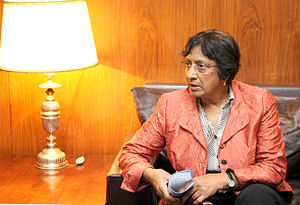 Navi Pillay image via Wikipedia
Navi Pillay image via WikipediaUN High Commissioner for Human Rights Navi Pillay 20 October presented her annual report [PDF] to the General Assembly. The written report touched on SOGI [sexual orientation and gender identity] issues in the following section of text:
“The Office continued to draw attention to human rights violations, including discrimination, perpetrated against individuals on the basis of their sexual orientation or gender identity. By resolution 17/19, the Human Rights Council, expressing grave concern at acts of violence and discrimination, in all regions of the world, committed against persons because of their sexual orientation and gender identity, requested me to commission a study on relevant discriminatory laws and practices and acts of violence. The findings of the study will be discussed by the Council at its nineteenth session.”
In her oral statement introducing her report this morning, the High Commissioner [HC] also mentioned SOGI-related work in the context of other discrimination-related work that the Office is carrying out, saying:
“Moving now to the topic of countering inequality and discrimination, OHCHR continued to draw attention to human rights violations, including discrimination, perpetrated against individuals on the basis of their sexual orientation or gender identity. In June, the HRC adopted resolution 17/19 “expressing grave concern at acts of violence and discrimination, in all regions of the world, committed against persons because of their sexual orientation and gender identity.” The resolution requests my Office to commission a dedicated study which will be discussed at the Council’s 19th session.”
During the Q and A session that followed the High Commissioner’s statements, a number of States asked questions or made statements referring to the Office’s focus on SOGI-related issues. Notably, the United Arab Emirates speaking on behalf of the Organization of Islamic Cooperation (OIC) devoted its entire statement to the issue, expressing serious concern at “an attempt to introduce to the United Nations some undefined notions that have no legal foundation in any international human rights instrument.”
The OIC was:
“disturbed at the attempt to focus on certain persons on the grounds of their sexual interests and behaviours … our alarm does not merely stem from concerns about the lack of legal grounds, but more importantly it arises from the ominous usage of that notion. The notion of sexual orientation spans a wide range of personal choices that expand way beyond the individual’s sexual interest. The OIC reaffirms that this undefined notion is not and should not be linked to existing international human rights instruments.”Speaking for the African Group, Kenya also expressed concern about the allocation of resources to “social issues” that lie outside of agreed human rights frameworks and urged the Office to wait until States are in agreement on the scope of such issues and any new obligations before pursuing work in such areas.
Benin suggested that the HC should restrict herself to human rights that were universally agreed by the internationally community and deplored the attempt to introduce new rights or concepts such as sexual orientation in the name of universality.
Iran also stressed the need for the HC to avoid insisting on issues which are not yet covered by internationally recognized norms and standards.
Speaking in support of the Office’s work in the area of SOGI were Chile, Ireland, Norway, South Africa, the United Kingdom, all of whom said they looked forward to the release of the HC’s forthcoming study on violence and discrimination against individuals on the basis of their sexual orientation and gender identity. In its statement, South Africa referred to the discussion of the study’s findings and recommendations in March as a potential opportunity for dialogue rather than finger-pointing.
In her response to question, the High Commissioner said:
“As a human rights challenge, countering discrimination based on sexual orientation and gender identity should be non-controversial. We are not trying to create new rights or extend human rights into new, uncharted territory. What we are doing is insisting that all people are entitled to the same rights and to the equal protection of international human rights law—doesn’t matter who they are, what they look like, or whether you approve of them or disapprove of them."
“In June 2011, the Human Rights Council adopted resolution 17/19, expressing deep concern at acts of violence and discrimination based on sexual orientation and gender identity. The resolution requests my Office to prepare a study documenting violence, discriminatory laws and discriminatory practices, and setting out ways in which international human rights law can be used to prevent these kinds of human rights violations in future. In March, we will have a panel discussion at the Human Rights Council, as foreseen in resolution 17/19, at which Member States can discuss the findings and recommendations contained in the study.
“If we can just focus on the facts, on the violations themselves—on cases of people being killed, raped, attacked, imprisoned, tortured and executed for being gay, lesbian bisexual or transgender, or simply discriminated against—then I think we will begin to see more and more support for action to address these problems in a more effective manner at the national level.”








 Join our page
Join our page


Sigh. LGBTI - I for intersex - rights should be non-controversial. And I foolishly thought the UN High Commissioner for Human Rights was beginning to be intersex-inclusive. Perhaps not.
ReplyDelete